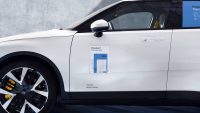The new car market saw its 22nd month of growth in a row in May with registrations rising by 1.7% versus last year to reach 147,678 units, according to figures released by the SMMT this morning.
It was the best May market performance since 2021, when sales hit 156,737, although the trade body said it was still nearly a fifth down (19.6%) on 2019’s figure of 183,724.
Fleets and companies continued to drive the growth, up 14.0% and 9.5% to 86,870 and 3,355 respectively, which narrowly offset a 12.9% fall in private retail sales to 57,453.
Deliveries of petrol and diesel cars decreased but demand for electrified vehicles went up, with plug-in hybrids (PHEVs) recording the highest growth of all powertrains – up 31.5% to reach an 8.0% market share.
Battery-electric vehicle (BEV) registrations also outperformed the market, rising to claim a 17.6% market share – up from 16.9% last May.
The best-selling new car of May 2024 was the Kia Sportage at 4,202 units. Second was the Ford Puma at 3,812, with the Audi A3 in third position at 3,017.
The fleet sector drove BEV uptake, though, at a 10.7% volume increase, with private uptake dropping by 2%, which the SMMT said was still below the ZEV mandate trajectory, which says 22% of new vehicles sold this year by each brand must be emission-free.
The SMMT said that while some private buyers had access to some of the benefits enjoyed by business buyers via salary sacrifice schemes, universal access to incentives would dramatically increase BEV uptake and speed up road transport decarbonisation.
The industry body repeated its call to temporarily halve VAT on new BEV purchases, as well as cut the VAT levied on public charging from 20% to 5% to put it in line with domestic use.
Doing that would put more than a quarter of a million EVs instead of petrol or diesel cars on the road over the next three years, it said.
SMMT chief executive Mike Hawes said: ‘As Britain prepares for next month’s general election, the new car market continues to hold steady as large fleets sustain growth, offsetting weakened private retail demand.
‘Consumers enjoy a plethora of new electric models and some very attractive offers, but manufacturers can’t sustain this scale of support on their own indefinitely.
‘Their success so far should be a signpost for the next government that a faster and fairer transition requires carrots, not just sticks.’
What the industry says
Less choice for consumers
The new car market remains sluggish and retail demand has flagged as a dearth of affordable new car models means less choice for consumers, despite fleet buyers underpinning the market.
Rising new car prices since 2019 mean that even volume brands are suffering as the middle market is hollowed out. The share of new models for sale below £20,000 in the past five years has dropped from 17% to just 4%, underlining the pressure on affordability.
The high prices are pushing many more buyers into the used market, where demand is up 9% this quarter on 2023. But they also leave the UK market vulnerable to more affordable competition, for example from Chinese electric vehicles.
Ian Plummer, commercial director, Auto Trader
Election unlikely to make much difference
Registration figures remain positive as consumer demand continues to grow.
However, whilst electric vehicle data may seem positive, statistics are still heavily skewed by fleet registrations.
Consumers still remain hesitant to switch to EVs, as inadequate infrastructure and the cost of switching continue to hold back widespread adoption.
The imminent general election is unlikely to have a material impact on registrations, although some may wait to see if any incentives are introduced before making a purchase.
Lisa Watson, director of sales, Close Brothers Motor Finance
Testament to strength of market
While the production of new cars in the UK continues to dip as manufacturers retool for the next generation of models, including EVs, this temporary downturn in output should have a minimal impact on sales.
Consumers looking to purchase new vehicles still have ample options available in the market despite the short-term manufacturing lull.
It’s a testament to the strength of the UK’s new car market that it is still recording growth each month, despite this quieter period for private sales and production disruptions.
James Hosking, managing director, AA Cars
Positive sign despite being below pre-pandemic average
Despite the numerous challenges, the automotive industry has shown remarkable resilience, with an encouraging rise in new car registrations for May. Although still below pre-pandemic averages, it’s a positive sign.
Fleet sales primarily drove BEV market share for the month, while private new car registrations remain, arguably, weak. That reflects a cautious buying public. However, manufacturers are relentless in their commitment to change. More than 100 EV models are on the market, and numerous tempting deals for consumers to go electric.
However, the challenge of meeting the government’s 22% zero-emission vehicle mandate this year is significant and requires immediate attention.
Philip Nothard, insight director, Cox Automotive



































